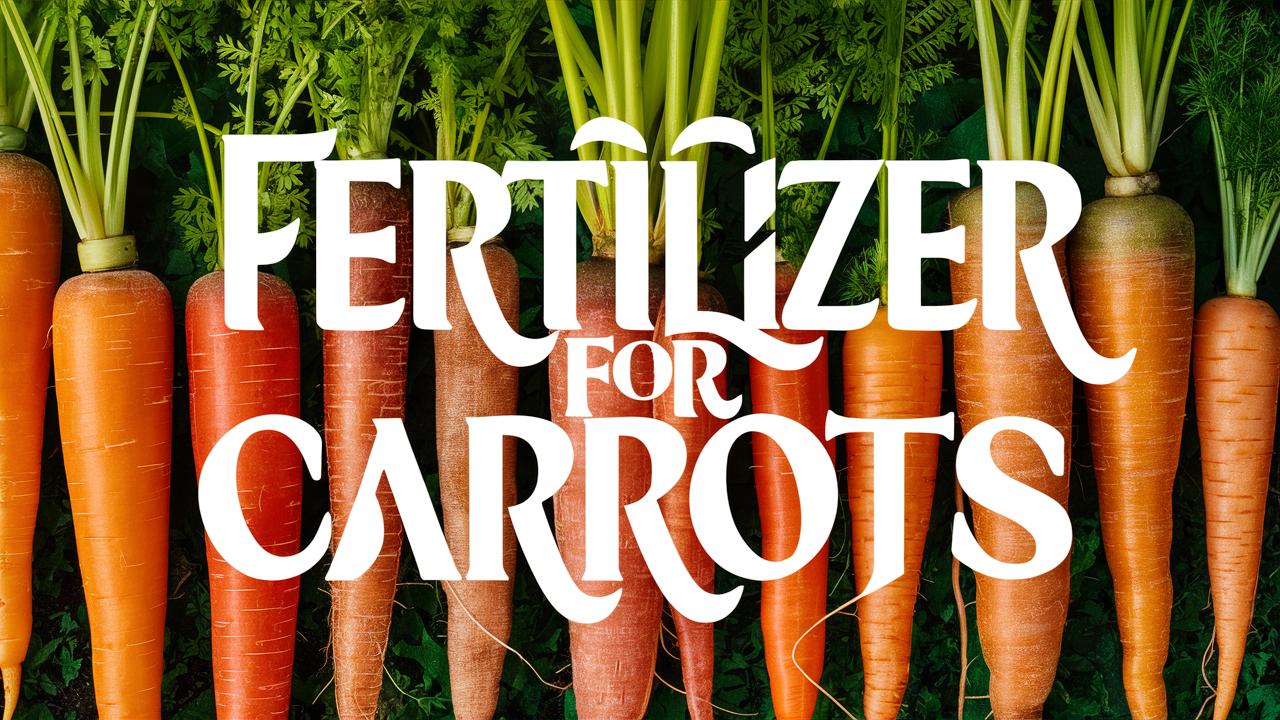In this guide, we will explore the various aspects of choosing fertilizer specifically for carrots, including soil testing, nutrient needs, types of fertilizers, application methods, and organic options.
Fertilizer For Carrots
| Image | Name | Rating | Shop |
|---|---|---|---|
 | Big A Carrot Fertilizer |  | |
 | Carrots Silica Solution |  | |
 | Down to Earth Bio Live Fertilizer |  |
Big A Carrot Fertilizer
 Here’s a short informal product recommendation for the ‘Big A Carrot Fertilizer’: If you’re looking to grow healthy carrots and other root vegetables in your garden, I’d recommend checking out the Big A Carrot Fertilizer. This organic plant food is specifically designed to promote robust growth and productivity in vegetable gardens. With its unique blend of kelp and essential nutrients like nitrogen, phosphorus, and potassium, you can expect a rich harvest with larger, more flavorful carrots. One of the things that sets this fertilizer apart is its highly soluble powder formula, which allows for rapid nutrient absorption and easy application directly to the soil before seeding. This makes it perfect for both indoor and outdoor gardens, and it’s also suitable for a wide variety of crops beyond just carrots – including yams, beets, onions, and more. Overall, I think Big A Carrot Fertilizer is a great option for anyone looking to get the most out of their vegetable garden.
Here’s a short informal product recommendation for the ‘Big A Carrot Fertilizer’: If you’re looking to grow healthy carrots and other root vegetables in your garden, I’d recommend checking out the Big A Carrot Fertilizer. This organic plant food is specifically designed to promote robust growth and productivity in vegetable gardens. With its unique blend of kelp and essential nutrients like nitrogen, phosphorus, and potassium, you can expect a rich harvest with larger, more flavorful carrots. One of the things that sets this fertilizer apart is its highly soluble powder formula, which allows for rapid nutrient absorption and easy application directly to the soil before seeding. This makes it perfect for both indoor and outdoor gardens, and it’s also suitable for a wide variety of crops beyond just carrots – including yams, beets, onions, and more. Overall, I think Big A Carrot Fertilizer is a great option for anyone looking to get the most out of their vegetable garden.
Carrots Silica Solution
This product seems like a good option for fertilizing your carrots. The ProfessSional Liquid Silica Plant Supplement is designed specifically to strengthen the stalks and stems of carrot plants, making them less prone to breakage.
The formula also protects delicate leaves from browning, ensuring they stay healthy and vibrant. It’s compatible with both hydroponic and soil-based systems, easy to mix and apply, and provides excellent value for money given its high concentration. If you’re looking for a reliable fertilizer to promote the health of your carrot plants, this product is worth considering.
Down to Earth Bio Live Fertilizer
If you’re looking for a natural and effective way to promote healthy carrot growth, we recommend the Down to Earth Organic Bio-Live Fertilizer Mix 5-4-2. This premium fertilizer is made from high-quality organic ingredients that work with your soil rather than harming it.
This beneficial fertilizer mix stimulates rooting, vigor, and optimal plant development in carrots, making it perfect for all types of plants. Plus, the OMRI certification ensures that it meets high standards for organic production. With its easy-to-use formula and effective results, the Down to Earth Organic Bio-Live Fertilizer Mix 5-4-2 is an excellent choice for any gardener looking to grow healthier, more productive carrot crops.
Organic Grower’s Pack
For fertilizing carrots, you might consider the Dr. Earth Organic 5 Tomato, Vegetable & Herb Fertilizer Poly Bag. It’s a good option for promoting healthy growth in various garden plants.
This fertilizer is made with 100% organic and natural ingredients, eliminating concerns about GMOs, chicken manure, or sewage sludge. The product contains pro-biotic strains of beneficial soil microbes and mycorrhizae to encourage abundant crops and nutritious vegetables. Since it feeds for several months, you may be able to apply it less frequently than with other fertilizers.
Cz Garden 5-10-10 Fertilizer
This fertilizer is a good choice for carrots due to its balanced NPK ratio of 5-10-10, which provides sufficient nitrogen, phosphorus, and potassium for healthy growth and development. Although it’s marketed as a tomato and vegetable fertilizer, the product description doesn’t indicate that it has any specific ingredients or properties that would not be beneficial for carrots.
The slow-release formula of Cz Garden 5-10-10 Tomato & Vegetable Fertilizer can also be advantageous when growing carrots. As it eliminates the risk of fertilizer burn and stays in the soil longer, it allows for a steady supply of nutrients to the plants, which can lead to improved growth and health.
Organic Fertilizer Grains by Jobe’s
If you’re looking for a reliable fertilizer for your carrot crop, we recommend Jobe’s Organics Granular Garden Fertilizer. This product is specifically designed for vegetable gardens like carrots, and its 2-5-3 NPK formula provides the necessary nutrients for high yield and healthy foliage.
The best part about Jobe’s organic fertilizer is that it’s made from natural ingredients with no synthetic chemicals, making it safe for your carrot plants and the environment. It’s also OMRI listed by the USDA, giving you confidence in its organic gardening credentials. Simply apply every 4-6 weeks or as needed during the growing season to keep your carrots thriving.
Understanding Carrot Nutritional Needs
Before delving into fertilizers, it’s important to understand what carrots need to thrive. Carrots, a member of the Apiaceae family, have specific nutritional requirements for optimal growth. The primary nutrients essential for carrots include nitrogen (N), phosphorus (P), and potassium (K), commonly referred to as N-P-K.
Nitrogen (N): This nutrient is vital for leafy growth and overall vigor. However, too much nitrogen can lead to lush foliage at the expense of root development. For carrots, moderate nitrogen levels are key to ensuring robust root formation without excessive foliage.
Phosphorus (P): Phosphorus supports root growth and energy transfer within the plant. A deficiency can result in stunted growth and poor root development, which are detrimental when cultivating root vegetables like carrots.
Potassium (K): This nutrient helps strengthen the cell walls and ensures better drought resistance. Potassium is important for flavor development, and carrots grown with adequate potassium often exhibit sweeter and more appealing flavors.
In addition to these macronutrients, carrots also benefit from micronutrients such as calcium, magnesium, boron, and manganese. These play roles in cellular function and overall plant health, aiding in processes like nutrient uptake and photosynthesis.
Soil Testing: The Foundation of Nutrient Management
The first step in choosing the right fertilizer for your carrots is conducting a soil test. Testing your soil can provide invaluable information about nutrient levels, pH balance, and organic matter content. Here’s how to go about it:
Collect Soil Samples: Use a clean trowel or soil probe to collect samples from various locations in your garden. Aim for a depth of about 6-8 inches, as this is where carrot roots will grow.
Label and Mix: Put your samples in a clean container and mix them to create a composite sample. This will give you a more accurate representation of your garden’s soil.
Send to Lab or Use a Kit: You can either send the sample to a professional lab for a comprehensive analysis or use a DIY soil testing kit available at garden centers.
Interpret Results: Review the results to determine nutrient levels and soil pH. Carrots prefer slightly acidic to neutral soil (pH 6.0 to 7.0). If your pH is outside this range, adjustments like lime (to raise pH) or sulfur (to lower pH) may be necessary.
By understanding your soil’s unique makeup, you can make informed decisions about which fertilizers to use and how much to apply, ultimately leading to healthier carrot plants.
Selecting the Right Fertilizer: Organic vs. Synthetic
When choosing fertilizer for your carrots, you’ll encounter two main categories: organic and synthetic fertilizers. Each option has its own benefits, and understanding these will help you make an informed decision.
Organic Fertilizers
Organic fertilizers are derived from natural sources, such as compost, animal manure, bone meal, and fish emulsion. They enrich the soil with organic matter, improve microbial activity, and promote long-term soil health. Here are some popular organic fertilizers for carrots:
Compost: A well-balanced compost can offer a broad spectrum of nutrients. Incorporating compost into your garden soil before planting can support healthy root systems.
Bone Meal: High in phosphorus, bone meal is ideal for promoting root development. It is particularly beneficial during the planting phase since it releases nutrients slowly.
Kelp Meal: This sea-derived fertilizer provides potassium and trace minerals. Kelp meal supports overall health and is known to enhance the flavor of carrots.
Fish Emulsion: This liquid fertilizer is rich in nitrogen and easy to apply. It’s ideal for young plants, providing an immediate nutrient boost.
Organic fertilizers may take longer to break down and release their nutrients compared to synthetics, but they contribute to the long-term health of your garden’s ecosystem.
Synthetic Fertilizers
Synthetic fertilizers are manufactured to contain specific ratios of nutrients. They are highly concentrated and often provide instant nutritional benefits to plants. Common synthetic fertilizers for carrots include:
N-P-K Fertilizers: These come in various formulations such as 5-10-10 or 10-10-10, varying the balance of nitrogen, phosphorus, and potassium. A formulation higher in phosphorus (like 5-10-10) might be suitable during the early growth stages for carrots.
Liquid Fertilizers: These offer quick nutrient absorption and are often used as foliar feeds. They can be especially effective during the growing season when rapid growth is taking place.
While synthetic fertilizers can provide a fast boost, they may lead to nutrient runoff and contribute to soil depletion in the long run if overused.
Understanding N-P-K Ratios
When selecting fertilizers, understanding N-P-K ratios is essential. The three numbers on a fertilizer label indicate the percentage of nitrogen, phosphorus, and potassium. Here’s how to interpret these ratios for carrots:
Balanced Ratios: For overall health, a balanced formula such as 10-10-10 can be used, especially if your soil test indicates a deficiency in all three nutrients. This ensures that carrots receive adequate nitrogen for growth, phosphorus for roots, and potassium for flavor.
High Phosphorus Ratios: Formulations like 5-10-10 are ideal when planting carrots, as they emphasize phosphorus for root growth while providing balanced potassium.
Low Nitrogen Ratios: Carrots don’t require high nitrogen levels, so fertilizers with ratios like 4-6-12 can be beneficial during late growth stages, ensuring robust roots without excessive foliage.
Choosing the right N-P-K ratio based on your soil’s needs can significantly impact your carrot yield.
Fertilizer Application Methods
Once you’ve selected your fertilizer, applying it correctly is crucial for maximizing its effectiveness. Here are some application methods tailored for carrots:
Pre-Planting Incorporation
Before planting carrots, it’s beneficial to incorporate fertilizers directly into the soil. This method ensures that nutrients are readily available for developing roots.
Mixing In: Spread the recommended amount of fertilizer over the planting area, and use a rake or tiller to mix it into the top 6-8 inches of soil.
Avoiding Direct Contact: When using synthetic fertilizers, take care not to let them come into direct contact with seeds or young seedlings, as the concentrated nutrients may harm them.
Fertilizing at Planting
You can also apply fertilizers when planting carrots:
Row Application: As you create rows for planting, sprinkle a small amount of fertilizer down the row before sowing seeds.
Soil Placement: You can also make small fertilizer bands beside the seed furrow, ensuring that when the roots grow, they’ll access these concentrated nutrients.
Side-Dressing
During the growing season, you may want to side-dress your carrots to provide additional nutrients:
Timing: Generally, carrots can benefit from a side-dressing application about four to six weeks after emergence.
Method: Scatter a balanced fertilizer alongside the plants, avoiding the root zone, and lightly work it into the soil or follow up with watering to activate it.
Foliar Feeding
In certain cases, especially when a quick nutrient boost is needed, foliar feeding can be effective:
Dilution: Mix a liquid fertilizer with water according to the product instructions and spray it directly onto the foliage.
Application Timing: Apply during the cooler parts of the day to prevent leaf burn and encourage optimal nutrient absorption.
Taking a thoughtful approach to fertilizer application can significantly enhance the growth of your carrots.
Monitoring Plant Health
As you care for your carrots throughout the season, be vigilant about monitoring their health. Look for signs that indicate nutrient deficiencies or excesses:
Nitrogen Deficiency: Yellowing of older leaves or stunted growth might signal a lack of nitrogen. A slight nitrogen boost can remedy this.
Phosphorus Deficiency: Dark green coloration with purplish undertones on leaves can indicate low phosphorus levels.
Potassium Deficiency: Symptoms include browning edges of leaves and weak plants that may be prone to disease.
Regular observation allows you to make timely interventions, ensuring that your carrots receive the nutrients they need.
Conclusions: Cultivating Beautiful Carrots
Choosing the right fertilizer for your carrots can make a significant impact on your garden’s success. By understanding the specific nutritional needs of carrots, conducting soil tests, selecting the appropriate fertilizer type and formulation, and applying it correctly, you are setting the stage for a bountiful harvest.








